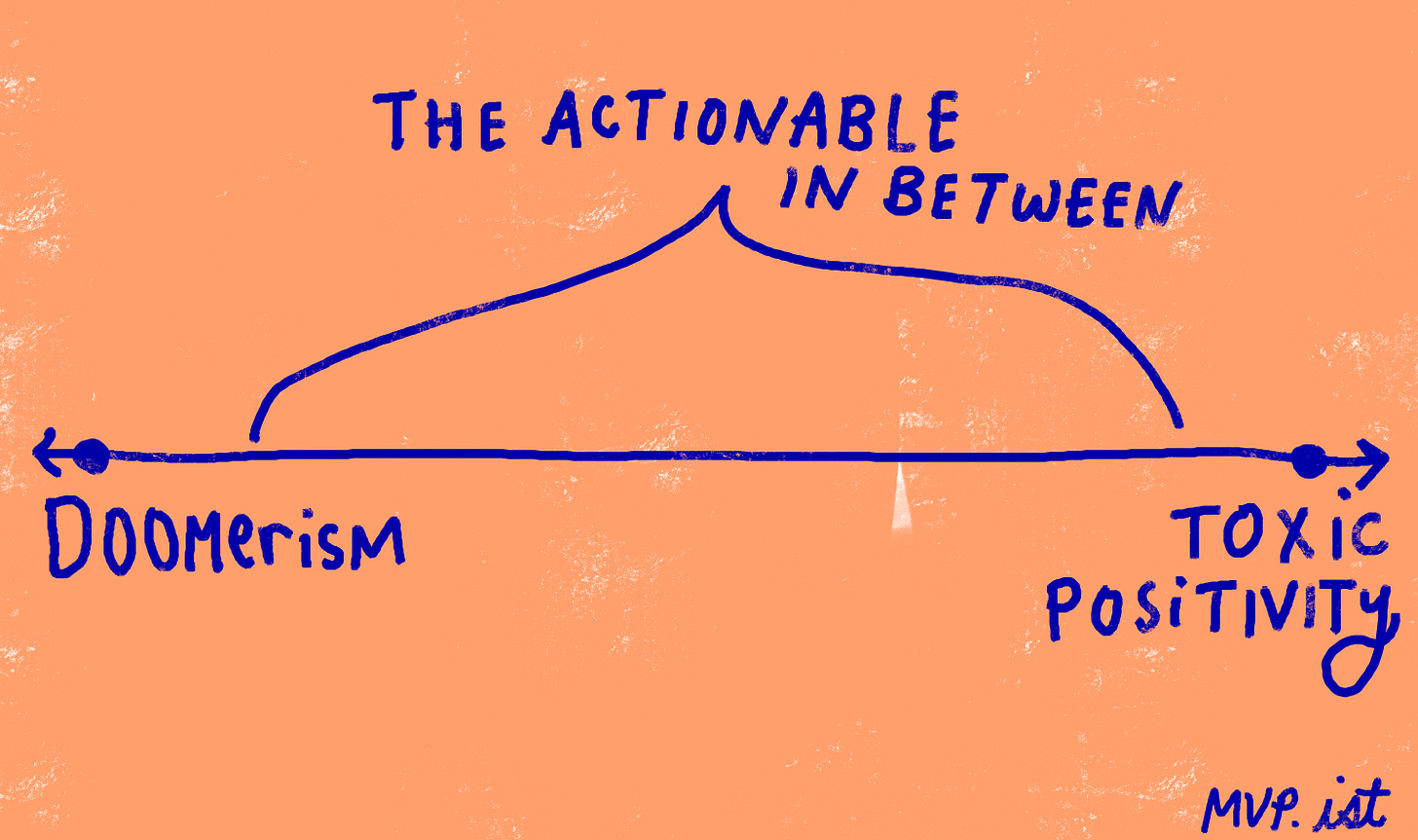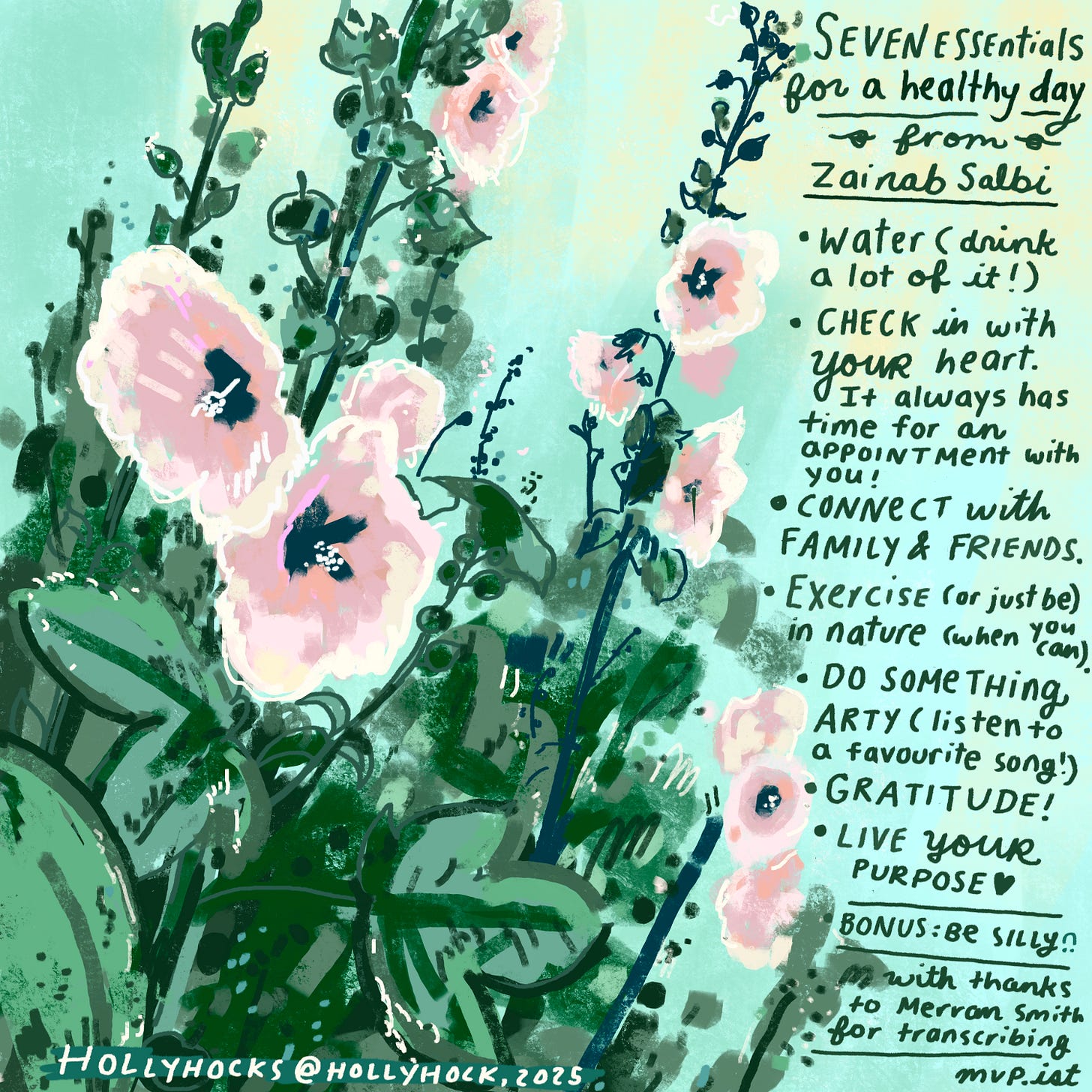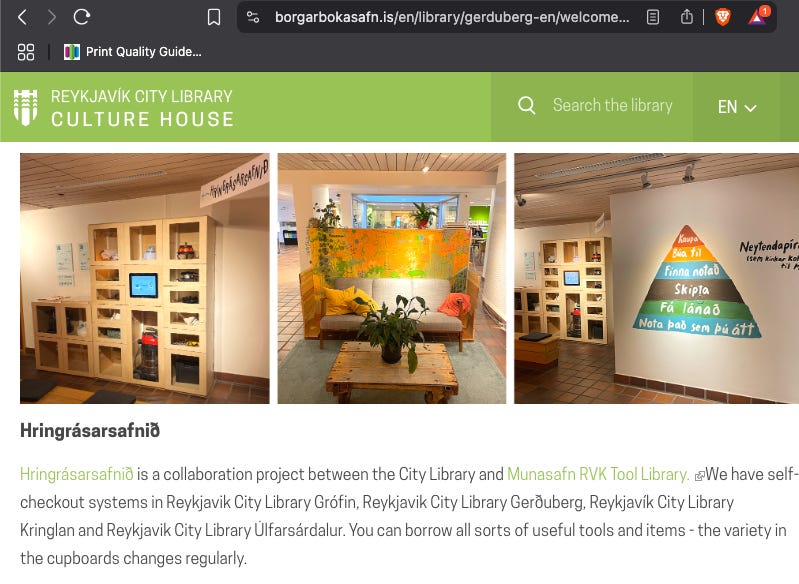What Brad Pitt and F1 taught me about climate motivation
Or, why I’m a nope on hope (but a oui on we!)
“Hope is not a strategy.” — Sonny Hayes (Brad Pitt), F1
“Globally, roughly a third more power is being generated from the sun this spring than last. If this exponential rate of growth can continue, we will soon live in a very different world.” — Bill McKibben
It was 37 degrees outside on Sunday, and we needed an afternoon filmic reprieve from the heat that would appeal to multiple generations and cinematic tastes. So we went to see F1: The Movie. You know they mean business when there’s a colon involved. As someone who has been trying to improve her puny pull ups for the better part of a year, I doff my cap to you, Mr. Pitt. I counted no less than 34,527 chin ups, many done inside a cramped Westfalia van. Is Big Pull Up Bar trying to muscle some attention? But why am I writing about F1? Well, hope is not a strategy is a line older than Old Man Pitt, but something about the man’s cheeky energy made me nod deeply in response to his dimpled utterance of said line. And more than made up for having had to sit through 2.5 hours of formulaic, if fun, filmmaking. Plus, I would watch Javier Bardem read the phone book. What’s a phone book? (Another wild thing: while I’m not into burning gas while the planet burns, F1 is hitting its Net Zero targets?)
But back to hope is not a strategy. It answers the hope/nope climate question so perfectly. And defines all that I try to get across in these messy missives. I don’t like the toxic positivity of climate ‘good news,’ and I find the hope question a distraction. Here’s the wonderful Ayana Elizabeth Johnson:
To go from A(yana) to Z(inn), here’s another take:
TO BE HOPEFUL in bad times is not just foolishly romantic. It is based on the fact that human history is a history not only of cruelty, but also of compassion, sacrifice, courage, kindness. What we choose to emphasize in this complex history will determine our lives. If we see only the worst, it destroys our capacity to do something. If we remember those times and places—and there are so many—where people have behaved magnificently, this gives us the energy to act, and at least the possibility of sending this spinning top of a world in a different direction. And if we do act, in however small a way, we don’t have to wait for some grand utopian future. The future is an infinite succession of presents, and to live now as we think human beings should live, in defiance of all that is bad around us, is itself a marvellous victory. ― Howard Zinn
This is beautiful to be sure. But everyone’s life experience is different and to demand hope of people is a presumptuous ask in a deeply broken and unequal world. One can appreciate all of the beauty in Zinn’s humanity without making it about hope. Seeing good and choosing to focus on it can just be a rational act of let’s go! Another spin on it:
I love this comment by way of Rebecca Solnit’s Facebook:
@ellearmageddon.bsky.social writes: "fwiw, i don’t personally think that either doomerism OR toxic positivity is what this moment calls for; i think what we actually need to be collectively looking towards is a secret third thing (hopepunk) it’s cool and important to give a shit, and to look for ways to help each other."
Exactly. What we need is this solarpunky, will-to-act energy, which could use a name (call a German?), as well as that last line above about making community aid cool, and normative.
Like Ayana, I just don’t want the reductionist explorations of hope and cheerful ‘good climate news’ lists. They leave me cold because they feel asymmetric to The Issue. The narrative we need is: this is happening, and we need to act faster. It’s why I love the name of the climate org, We Act. It implies collectivity and declares action. We are acting.
This core narrative of action is about a fundamental transition that is underway, and needs our shared energy. As usual, Bill McKibben is leading the charge with the propulsive story about how we will do this, saving all we can save in the process. His book, Here Comes the Sun, beams out this August. McKibben’s latest piece in the New Yorker, adapted from said forthcoming book, is a ray of light, and worth reading in full (go on, I’ll wait!) It tells the shiny story of the sun’s ascendancy, and it’s not about hope so much as what is really happening, a sweeping transformation that has the potential to not just solve for climate, but autocracy:
All this suggests that there is a chance for a deep reordering of the earth’s power systems, in every sense of the word “power,” offering a plausible check to not only the climate crisis but to autocracy. Instead of relying on scattered deposits of fossil fuel—the control of which has largely defined geopolitics for more than a century—we are moving rapidly toward a reliance on diffuse but ubiquitous sources of supply. The sun and the wind are available everywhere, and they complement each other well; when sunlight diminishes in the northern latitudes at the approach of winter, the winds pick up. This energy is impossible to hoard and difficult to fight wars over. If you’re interested in abundance, the sun beams tens of thousands of times more energy at the earth than we currently need. Paradigm shifts like this don’t come along often: the Industrial Revolution, the computer revolution. But, when they do, they change the world in profound and unpredictable ways.
I believe that we will change the world in the coming decades. With the sun, we have the energy and economics we need to fight. And with political ballast in the form of an ever-diminishing license for fossil fuel proponents (no matter what Lee Zeldin does), we will push forth.
It can be hard to discern which legal decisions are meaningful, but, by every estimation, last week’s ruling, by the UN’s top court (the ICJ), that countries could be in violation of International law if they fail to protect the planet from climate change, is hugely significant. Can we leverage it to fight folks who still think there’s a world where we can export LNG to Europe and not cook the planet? Maybe!
Why do I write about climate motivation all all the time? Because it is the singular narrative WE HAVE TO GET RIGHT: 1. We must make energy efficiency the default wherever we can, so people don’t have to think about this stuff. 2. And when we do need them to think about it, we must use language that inspires action. Hope, like Brad said, and Giuliani (ugh) before him, is not a strategy. It’s an emotion. The comms strategy is a positive and consistent articulation of relentless action. Demonstrating the wins, and the inevitability of this transformation, is key to driving that action.
This is extra important because we’ve got a coffee straw, and the oppo has a fire hose. It’s not that people don’t care, it’s that they NEVER hear about climate, and always hear misinfo. Writes the brilliant Ed Maibach: “The climate silence is defining. Only 1 in 10 Americans see anything about it on social media in a given week and even fewer (1 in 20) hear people they know talking about it in a given week.” Which is why I started a program called Talk Climate to Me a million years ago. We have to talk about climate all the time, and we have to make it simple and actionable, because the transition is inevitable, but the amount of suffering incurred depends on the speed and scale of our action.
Brad Pitt’s character in F1 is called Sonny Hayes. Which is fun. Sunny Haze. He’s a walking contradiction, an affable vaguery. But it also reminds me of Sunny Ways, a certain former Prime Minister’s nod to another PM, Wilfrid Laurier, who was known to inspire people with his warm words. Alas, Trudeau’s resurrection of Sunny Ways failed, because people don’t need cheer, hope, and tap dancing to alight their spirits. They need to see their leaders doing real, meaningful things that inspire big and little action, which may or may not give them hope, but will always give them purpose. Dimples optional.
(On this note: An absolutely great climate comms guide from my friend Anirudh and the team at Rare. Check it!)
This planet
Watt’s up? LMK!
Last planet
Efficiency, equality, electrotech (and reggaeton). I met so many lovely people on my month off, thanks for chatting, Clemence and Pippa! And new TO climate pal, Jenn! And 70+ climate ladies at an incredible summit. More below!
Stuff
🟢 Be a Karen?
I love this woman, and this story of community support.
🟢 Shitty Mending Club: Thursday, August 7th!
Patch your leggings, build community, talk climate, drink pink things.
I was blown away by the Insta responses to my slightly tongue in chic story about about restarting Shitty Mending Club. What was it? An infrequent hang at my place where everyone was welcome to come and patch up their pile of broken garments. So/sew, let’s bring it back to life, like the overalls I just resuscitated with the world’s worst sashiko! If you’re in Toronto, we’ll be at Bickford Park, 7ish on, on Thursday, August 7th, SW quadrant. Message me for more info, or just show up with your broken things. BYOB (Bring your own bobbin, blanket, beverages) but I’ll have extra sewing basics and snacks. If you want to bring together the menders in your hood or city, by all means, go for it, and let me know how it sews! Here are some graphics you can use.
🟢 Strong Signals!
The incredible Merran Smith and the folks over at New Economy Canada put out a very solid report this week: Strong Signals in the Noise. DYK, Canada is already the 8th largest economy for clean energy investment? Now’s the time to seize the opportunity (and stop talking about decarbonized oil, much less drilling for methane!)
🟢 Heat pump explainers, round 3,423.
Drew Tozer commissioned this animated beauty.
🟢 Joanna Macy.
The legendary and beloved teacher passed away last week at 96. Rebecca Solnit writes about her beautifully here.
🟢 Women in Climate.
I was lucky enough to spend time with 70(!) brilliant climate leaders at an incredible gathering in British Columbia last week, hearing from the likes of Xiye Bastide and Sheila Watt-Cloutier, among a million others. Each of them brought so much. My biggest worry was how I’d carry the wisdom of the week back home with me, and not return to my life of listening to podcasts at 1.5 speed. I loved this daily recipe that the amazing climate activist Zainab Salbi shared with me one day over lunch, so here ya go:
🟢 Abolishing Alligator Alcatraz.
My friends at Friends of the Everglades have been working hard to fight this terrible thing. I made a poster for them that you can purchase to help support their excellent work! (Yes, that’s Marjory Stoneman Douglas in the middle!)
🟢 BUYERARCHY on ice!
Thank you, Reykjavik, for this beautiful mural-size print of my work and wonderful collective space! Soooo cool.
People dancing
Thank you!
→ Thank you new subscribers! Welcome welcome. Check out my about page for more frills and ruffles.
→ I will never not love you tapping the 💚 below when you like an edition of this ‘sletter, or sending me a note with suggestions and ideas for how to improve it.
→ You can always help me juice the algo by sharing this newsletter with people you (hopefully) like, recommending it on your own stack, or upgrading your subscription.
Hope you are taking good care,
Sarah













Go, sister! Your goodness in a dire situation!
Helene dropped all her messages on my community. Just as I was working on Rights of Nature for the Swannanoa River who also delivered her messages in floods and landslides. 🌱🌿💚
Sarah, I love everything about your essay (perhaps especially your determination to master the pull up—the ultimate Yoda-approved mind training technique) except the phrase “toxic positivity.” Maybe I’m lucky (for sure, I am, although as they say: the harder I work, the luckier I get) but I can’t ever recall being around someone whose positivity in any way deflated my determination. For me, people who maintain their positivity in the face of long odds are like oxygen (and since I’m invoking that old metaphor, allow me to say the song has it wrong: you don’t get too high if you get too much love, or oxygen). I use positivity as a strategy—a self-management strategy and a strategy to help others maintain their motivation. I don’t know you well, but I suspect you do too. Your positivity radiates— helping to shield others from the kryptonite-like effects of the insanity that rages around us—and I thank you for that. Onward and upward!